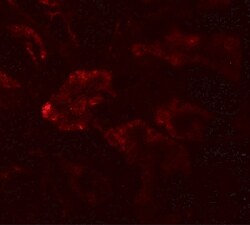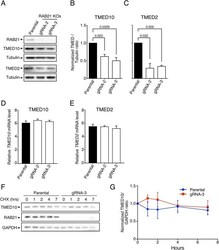Antibody data
- Antibody Data
- Antigen structure
- References [1]
- Comments [0]
- Validations
- Immunohistochemistry [1]
- Other assay [1]
Submit
Validation data
Reference
Comment
Report error
- Product number
- PA5-34404 - Provider product page

- Provider
- Invitrogen Antibodies
- Product name
- RAB21 Polyclonal Antibody
- Antibody type
- Polyclonal
- Antigen
- Synthetic peptide
- Description
- A suggested positive control is mouse kidney tissue lysate. PA5-34404 can be used with blocking peptide PEP-1446.
- Reactivity
- Human, Mouse, Rat
- Host
- Rabbit
- Isotype
- IgG
- Vial size
- 100 μg
- Concentration
- 1 mg/mL
- Storage
- Maintain refrigerated at 2-8°C for up to 3 months. For long term storage store at -20°C
Submitted references RAB21 interacts with TMED10 and modulates its localization and abundance.
Del Olmo T, Lacarrière-Keïta C, Normandin C, Jean D, Boisvert FM, Jean S
Biology open 2019 Sep 9;8(9)
Biology open 2019 Sep 9;8(9)
No comments: Submit comment
Supportive validation
- Submitted by
- Invitrogen Antibodies (provider)
- Main image

- Experimental details
- Immunofluorescence of RAB21 in human kidney tissue with RAB21 Polyclonal Antibody (Product # PA5-34404) at 20 µg/mL.
Supportive validation
- Submitted by
- Invitrogen Antibodies (provider)
- Main image

- Experimental details
- Fig. 4. RAB21 knockout reduces TMED10 and TMED2 protein levels. (A) Western blotting showing TMED10 and TMED2 protein levels in parental and RAB21 knockout cells. Endogenous TMED10, TMED2, RAB21 and Tubulin were blotted. Tubulin was used as a housekeeping gene, n =4 independent experiments. (B,C) Quantification of relative protein expression shown in A. TMED10/Tubulin (B) and TMED2/Tubulin (C) protein ratios were normalized to parental cells, error bars are s.e.m. One-sample t -tests were used for statistical analysis. (D,E) Quantitative PCR analysis of TMED10 and TMED2 transcripts, respectively, n =4 independent experiments, error bars are s.e.m. Unpaired t -tests were used for statistical analysis. No statistical differences were observed and are thus not displayed. (F,G) TMED10 stability assay. Cycloheximide chases were performed to monitor TMED10 stability in parental and RAB21 gRNA-3 KO HeLa cells, n =3 independent experiments. (F) Endogenous TMED10, RAB21 and GAPDH were assessed through western blotting. (G) Quantification of relative protein expression shown in F, error bars are s.e.m. Unpaired t -tests were performed and no statistical differences were observed and therefore are not displayed.
 Explore
Explore Validate
Validate Learn
Learn Western blot
Western blot Immunohistochemistry
Immunohistochemistry